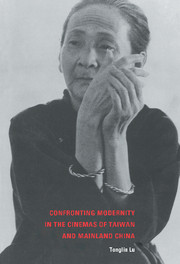Book contents
- Frontmatter
- Contents
- List of Illustrations
- Acknowledgments
- Introduction
- PART I ON THE CULTURAL AND IDEOLOGICAL MARGINS
- PART II IN SEARCH OF TRADITION IN THE MIDST OF MODERNIZATION
- PART III THE THIRD-WORLD INTELLECTUAL IN THE ERA OF GLOBALIZATION
- 5 The Zhang Yimou Model
- 6 Culture and Violence
- 7 A Postcolonial Reflection
- Epilogue
- Notes
- Glossary
- Bibliography
- Filmography
- Index
5 - The Zhang Yimou Model
Published online by Cambridge University Press: 12 January 2010
- Frontmatter
- Contents
- List of Illustrations
- Acknowledgments
- Introduction
- PART I ON THE CULTURAL AND IDEOLOGICAL MARGINS
- PART II IN SEARCH OF TRADITION IN THE MIDST OF MODERNIZATION
- PART III THE THIRD-WORLD INTELLECTUAL IN THE ERA OF GLOBALIZATION
- 5 The Zhang Yimou Model
- 6 Culture and Violence
- 7 A Postcolonial Reflection
- Epilogue
- Notes
- Glossary
- Bibliography
- Filmography
- Index
Summary
The paradox of phallocentrism in all its manifestations is that it depends on the image of the castrated woman to give order and meaning to its world. An idea of woman stands as a linchpin to the system: it is her lack that produces the phallus as a symbolic presence, it is her desire to make good the lack that the phallus signifies.
– Laura MulveyDuring the 1980s and 1990s, Chinese cinema has become relatively popular among Western filmgoers, especially critics. Chinese films won various prestigious awards at international festivals. At the same time, the so-called Chinese cinema includes three regional cinemas that are fairly independent from one another: mainland Chinese, Taiwanese, and Hong Kong cinemas. The most internationally recognized filmmakers, those of the Fifth Generation, emerged on the mainland with the two films One and Eight (Yige he bage), directed by Zhang Junzhao, and its better-known close follower, Yellow Earth (Huang tudi), by Chen Kaige. Both films, released in 1984, stunned audiences with their ambitious experimentations. The young directors grouped under the ambiguous label Fifth Generation were born in the 1950s and were mostly graduates from the first post–Cultural Revolution class at Beijing Film Institute.
One may divide their development roughly into two major steps. The first step can be characterized as experimental. During the early 1980s, China started opening up economically, culturally, and also to an extent politically. At the same time, since studios were still owned by the government, filmmakers did not need to worry much about box office.
- Type
- Chapter
- Information
- Publisher: Cambridge University PressPrint publication year: 2001



